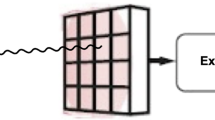Abstract
In spite of a very mixed record of success and failure, Regge theory, in which the notion of complex angular momentum is introduced into quantum mechanics still lives on. What has dissuaded physicists from discarding it, and what is our present assessment of the theory?
Similar content being viewed by others
References
Regge, T. Nuovo Cimento 14, 951 (1959).
Kronig, R. J. opt. Soc. Am. 12, 547 (1926).
Kramers, H. A. Atti. Congr. Intern. Fisici, Como 2, 545 (1927).
Gracomelli, G. Phys. Rep. 23 c, no. 2 (1976).
Baker, W. F. et al. Phys. Lett. 38 B, 342 (1974).
Joynson, D., Leader, E., Lopez, C. & Nicolescu, B. Nuovo Cimento 30 A, 345 (1975).
Meuller, A. H. Phys. Rev. D 2, 2963 (1970).
Author information
Authors and Affiliations
Rights and permissions
About this article
Cite this article
Leader, E. Why has Regge pole theory survived?. Nature 271, 213–216 (1978). https://doi.org/10.1038/271213a0
Published:
Issue Date:
DOI: https://doi.org/10.1038/271213a0
- Springer Nature Limited





